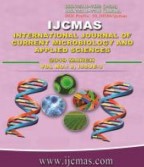


 National Academy of Agricultural Sciences (NAAS)
National Academy of Agricultural Sciences (NAAS)

|
PRINT ISSN : 2319-7692
Online ISSN : 2319-7706 Issues : 12 per year Publisher : Excellent Publishers Email : editorijcmas@gmail.com / submit@ijcmas.com Editor-in-chief: Dr.M.Prakash Index Copernicus ICV 2018: 95.39 NAAS RATING 2020: 5.38 |
The temperature increase above the optimum level cause irreversible damage to plant growth and development. Plants respond to high temperature through acclimation (acquired thermotolerance) by adopting several physiological and biochemical mechanisms to overcome high temperature stress. Hence, the present study was done to evaluate tomato genotypes for their thermo tolerance based on the principle of ‘‘acquired tolerance’’. Four true leaf stage seedlings of fourteen tomato genotypes were subjected to a gradual temperature increase from 33 to 43 °C for 3 h followed by challenging temperature of 45 °C for 3 h. The response of tomato genotypes was assessed by activity of antioxidant enzymes and osmoprotectants. An increase in the activity of SOD, POD and CAT was observed across the genotypes. The accumulation of sugars such as sucrose, inositol, fructose and glucose was higher in all the tomato genotypes subjected to induction treatment. The genotypes Abhinava, Arka Rakshak, Arka Ananya, IIHR-335, IIHR-329 and IIHR-369 showed higher thermo-tolerance with increase in osmoprotectants and by maintaining a strong antioxidant enzyme system.
 |
 |
 |
 |
 |